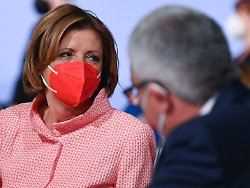Tuesday, May 18, 2021
Continuation of the traffic light coalition
Dreyer continues to rule in Rhineland-Palatinate
SPD politician Malu Dreyer has been Prime Minister of Rhineland-Palatinate since 2013. In the election last March, the Social Democrats defended their position as the strongest force. The state parliament has now confirmed the 60-year-old for another term of office.
The SPD politician Malu Dreyer has been elected Prime Minister of Rhineland-Palatinate for the third time. The 60-year-old immediately received 55 of the 101 votes at noon in Mainz. Your second traffic light coalition has just as many MPs. The 46 opposition MPs voted against Dreyer. Rhineland-Palatinate is currently the only federal state in which a tripartite alliance of the SPD, the Greens and the FDP governs.
“Mr President, I accept the election and thank you very, very much for your confidence,” said Dreyer after the election. She spoke the formula of the oath with the religious addition “so help me God”. The state parliament met in the Rheingoldhalle because of the pandemic and the distance rules. Contrary to what was initially planned, the plenary sessions will only return to the historic Deutschhaus on the banks of the Rhine after the summer break, which has been extensively renovated since the end of 2015.
For the first time, six parliamentary groups are represented in the new state parliament. The free voters move into parliament with six members – a novelty for Rhineland-Palatinate. Together with the FDP, you are the smallest parliamentary group in the state parliament.
At the beginning of May, the SPD, Greens and FDP approved the coalition agreement to continue their government at separate party congresses. The “Future Treaty Rhineland-Palatinate 2021 to 2026”, which came about in a good five weeks of negotiations, is entitled “Coalition of Awakening and Future Opportunities”. Most ambitious goal on more than 180 pages: climate neutrality by 2040 at the latest.
Dreyer has ruled since 2013 after Kurt Beck resigned. In her first election she had already received all the votes from the coalition – at that time it was only the SPD and the Greens. In 2016, all (then 52) MPs from the three alliance partners immediately voted for Dreyer.
In the state elections on March 14th, the SPD was again the strongest force with 35.7 percent. The Greens were the only parties represented in parliament to gain ground and replaced the FDP as the second strongest partner in the three-party alliance. The CDU with its top candidate Christian Baldauf achieved its historically worst result in the country with 27.7 percent. The AfD lost even more percentage and landed only at 8.3 percent.
.
